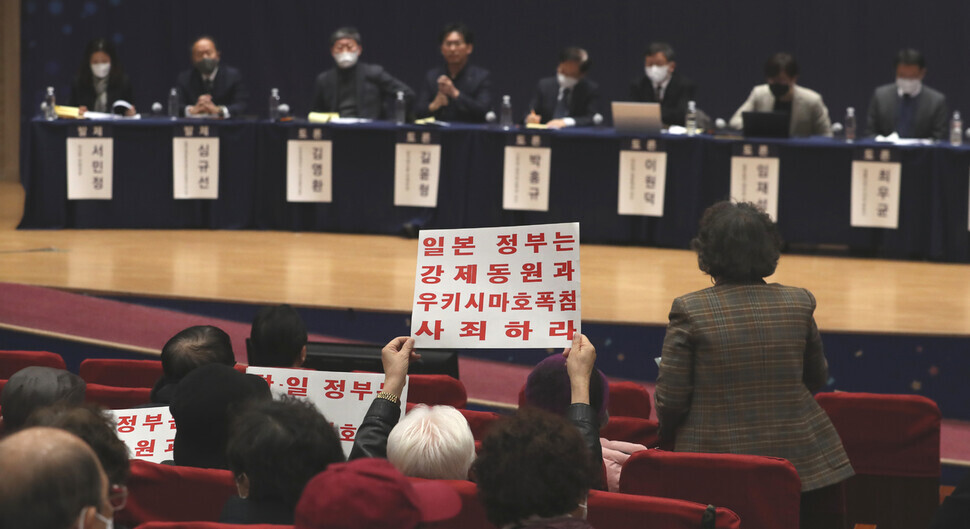hankyoreh
Links to other country sites 다른 나라 사이트 링크
Japanese accountability absent from Korea’s plan for wartime forced labor compensation

The South Korean government has officially unveiled a plan to have the Foundation for Victims of Forced Mobilization by Imperial Japan, under the Ministry of the Interior and Safety, raise money to compensate Koreans who were conscripted for labor during Japan’s colonial rule of Korea. While the plan is designed to resolve the two countries’ dispute over the forced labor issue, trouble is brewing because the victims want compensation and an apology from Japanese companies and the Japanese government and because it’s unclear whether Japan will sign on.
“The possibility of the judgment being repaid by a third party instead of the Japanese companies that are the defendants was reviewed [by the public-private deliberative body] in terms of claims and debt fulfillment in a civil case,” said Seo Min-jung, director-general for Asia-Pacific affairs at Korea’s Ministry of Foreign Affairs.
Seo was speaking during a public debate about solutions to the forced labor issue that was jointly hosted at the National Assembly on Thursday by the Foreign Ministry and Chung Jin-suk, head of the Korea-Japan Parliamentarians’ Union.
In 2018, the Korean Supreme Court ordered Nippon Steel and Mitsubishi Heavy Industries, both Japanese companies that committed war crimes, to pay fifteen victims of forced labor damages ranging from 100 million to 150 million won, but the companies in question have refused to discuss the damages.
“I think we ought to begin by accepting funds from the companies that were recipients of funds [provided by Japan] in the claims agreement,” said Shim Gyu-seon, chair of the foundation’s board. The suggestion is that funds for compensation would be collected from Korean companies such as POSCO, the Korea Exchange Bank (now part of Hana Bank) and the Korea Electric Power Corporation (KEPCO) that benefited from the 1965 agreement reached by Korea and Japan to settle outstanding claims.
“I understand that the victims are also cognizant of the fact that it’s not feasible to convince the defendant companies to pay the judgment given the sharply divergent positions of our two countries,” said Seo, suggesting that Japanese companies are unlikely to donate to the compensation fund.
“It’s important for Japan to sincerely uphold and maintain the heartfelt apology and contrition it has already expressed,” the Foreign Ministry official said, explaining that Japan might only reconfirm the position of remorse for the past expressed by past Japanese administrations, rather than apologizing directly for the forced labor issue.
The Korean government plans to finalize this plan after seeking consent from the victims.
During the debate, this plan was criticized by Kim Yeong-hwan, head of external cooperation at the Center for Historical Truth and Justice, a group that supports the victims. Kim suggested that “by paying the victims and waiting for Japan to follow suit, Korea is completely absolving Japan of responsibility.”
Im Jae-seong, an attorney representing the victims, also attended the debate. “What the victims want is an acknowledgment of the fact of compulsory mobilization and an apology and remorse for that. The apology currently being sought by the Foreign Ministry would be unacceptable,” Im told reporters afterward.
Prior to the debate, representatives for the victims, members of civil society and opposition lawmakers voiced their strong opposition to the Yoon administration’s “humiliating solution” in a press conference in front of the National Assembly.
By Shin Hyeong-cheol, staff reporter
Please direct questions or comments to [english@hani.co.kr]

Editorial・opinion
![[Guest essay] Maybe Korea’s rapid population decline is an opportunity, not a crisis [Guest essay] Maybe Korea’s rapid population decline is an opportunity, not a crisis](https://flexible.img.hani.co.kr/flexible/normal/500/300/imgdb/original/2024/0430/9417144634983596.jpg) [Guest essay] Maybe Korea’s rapid population decline is an opportunity, not a crisis
[Guest essay] Maybe Korea’s rapid population decline is an opportunity, not a crisis![[Column] Can Yoon steer diplomacy with Russia, China back on track? [Column] Can Yoon steer diplomacy with Russia, China back on track?](https://flexible.img.hani.co.kr/flexible/normal/500/300/imgdb/original/2024/0430/1617144616798244.jpg) [Column] Can Yoon steer diplomacy with Russia, China back on track?
[Column] Can Yoon steer diplomacy with Russia, China back on track?- [Column] Season 2 of special prosecutor probe may be coming to Korea soon
- [Column] Park Geun-hye déjà vu in Yoon Suk-yeol
- [Editorial] New weight of N. Korea’s nuclear threats makes dialogue all the more urgent
- [Guest essay] The real reason Korea’s new right wants to dub Rhee a founding father
- [Column] ‘Choson’: Is it time we start referring to N. Korea in its own terms?
- [Editorial] Japan’s rewriting of history with Korea has gone too far
- [Column] The president’s questionable capacity for dialogue
- [Column] Are chaebol firms just pizza pies for families to divvy up as they please?
Most viewed articles
- 1Dermatology, plastic surgery drove record medical tourism to Korea in 2023
- 2[Guest essay] Maybe Korea’s rapid population decline is an opportunity, not a crisis
- 3Months and months of overdue wages are pushing migrant workers in Korea into debt
- 4Under conservative chief, Korea’s TRC brands teenage wartime massacre victims as traitors
- 5First meeting between Yoon, Lee in 2 years ends without compromise or agreement
- 6[Column] Can Yoon steer diplomacy with Russia, China back on track?
- 7[Editorial] Japan’s rewriting of history with Korea has gone too far
- 8[Editorial] When the choice is kids or career, Korea will never overcome birth rate woes
- 9[Column] Why Korea’s hard right is fated to lose
- 10Korean research team finds potential link between nanoplastics, obesity